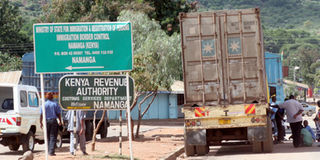Tanzania disowns levy on Kenyan vehicles

Photo/FILE
Last week, the Kenya-Tanzania border in Taveta was temporarily closed after motorists protested the increment of vehicle levy by Tanzanian authorities.
A decision by Tanzanian border officials to levy Sh17,000 (US$200) for vehicles ferrying goods from Kenya has been disowned by their government. (READ: Border closed over fee)
The country’s minister for East African Cooperation, Mr Samuel Sitta, told reporters in Namanga that local authorities had increased the charges behind the government’s back.
“My government was not involved at all. Really, we cannot allow something which is against the law (Common Market Protocol). Local authorities have no powers to interfere with international matters,” said Mr Sitta on Wednesday.
But he did not say whether the Tanzanian authorities would intervene to overturn the decision.
The matter came up on Wednesday when ministers responsible for East Africa affairs from Kenya and Tanzania toured the border area to promote regional integration.
The Kenyan delegation was led by EA Affairs Minister Musa Sirma and included officials responsible for marketing the integration.
It is the latest in a series of complaints by Kenyan businessmen operating across the border.
Kenyan businesses have complained that their goods are subjected to further testing by Tanzania’s Bureau of Standards despite meeting the standards set by the East African community and the Kenya Bureau of Standards.
But Kenyan businesses seem to be heading south in spite of the restrictions, with data gathered by the Kenya National Bureau of Statistics indicating that exports to Tanzania grew by 65.6 per cent from Sh3.6 billion in October to Sh5.9 billion in November.
Kenyans also face restrictions on investing at the Dar es Salaam Stock Exchange. In Tanzania, the maximum participation by foreign investors in listed companies is capped at 60 per cent, 75 per cent in Kenya but 100 per cent in Uganda and Rwanda.
Kenyans shunned the recent Tanzania Breweries share sale, held in December, with the results announced in early January showing East Africans got a small allocation.
Tanzanians took up 55.24 per cent of the 59 million breweries shares that were on offer, foreign investors were allocated 44.72 per cent of the shares, while East African investors got a paltry 0.04 per cent of the shares.
Kenyans also have to pay for a Tanzanian work permit.
Mr Sitta said the decision to increase the vehicle levy had been a creation of local authorities on the Kenya-Tanzania border, and not a government directive.
Last week, the Kenya-Tanzania border in Taveta was temporarily closed after motorists protested the increment of vehicle levy by Tanzanian authorities.
They had imposed a levy of Sh17,000 ($200) for vehicles entering the country.
Despite talks by authorities from the two countries on Saturday, the Nation found out that motorists were still being charged Sh17,000 by yesterday. Those who refused had their vehicles impounded at Tanzania’s border point of Holili.
Most of those who parted with the money were ferrying perishable goods.
Under the Common Market Protocol that took effect in July 2010, the community countries had to progressively allow free movement of people, labour and goods. In addition, the Customs Union, that started in 2005, proposed to unify tax laws and eliminate other restrictions to trade.
But the reality is that each of these countries has their own internal laws that seem to contradict or slow down the implementation of these protocols. In Tanzania for instance, it has also been a rule to have a yellow fever certificate before one is allowed within its borders.
Those without the certificate have to part with $50 and then receive yellow fever vaccination.
But the Tanzanian Minister told reporters the rule was also illegal because it was only a regulation in the country’s Ministry of Health.
“We followed it up and discovered that it is really being levied under a bylaw under the Ministry of Health. This really cannot be permitted. They have taken their time but we are seeing the end of this bothersome practice.”
On Wednesday, Kenyan and Tanzanian officials sought to iron out the differences.
Mr Sirma and Mr Sitta held talks with local administrators from both sides before holding a joint rally in Tanzania.
Travel documents
They later pledged to convince their respective governments to allow the administrators issue temporary travel documents to border residents.
After the rally, the two told journalists that they would instruct local authorities to only levy fees approved by the EAC ministerial council.
Kajiado County Council in which Namanga (Kenya) belongs, is said to be charging transit trucks Sh2,000 for “passing through its territory.”
“Local authorities are not allowed to charge transit vehicles any fees. It is illegal,” said Mr Sirma .
However, there was little indication that the $200 fee at Holili would be removed. Mr Sitta did not announce that the levy be stopped or reduced. Instead, he said he would visit the border point some time next month to assess the situation.




